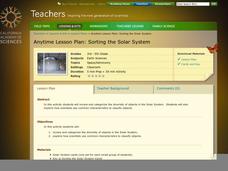Curated OER
Microscope Pictures
For this microscope worksheet, students find 9 different objects from their environment, view them under a microscope, and draw what they see.
Lincoln Public Schools
Cell Exploration Activities
Engage young biologists in exploring the mysteries of life with this collection of hands-on activities. Enlisting the help of numerous digital resources, students get an up-close look at the structure of plant and animal...
Baylor College
Tools of Magnification
Life science learners need to be able to use a microscope. With this comprehensive resource, they first experience how lenses and magnification work, and then get familiar with using a compound microscope. Tremendous background...
Curated OER
Electron Microscope
In this microscope worksheet, students use an on line site to answer questions about how a Scanning Electron Microscope works. They also conduct a virtual microscope activity where they view ten specimens and identify what each is.
Curated OER
I Breath What? Activity-Pollution Detector Worksheet
In this pollution worksheet, students collect particles using a pollution detector and then observe their results under the microscope. They calculate the average number of particles collected in three different locations. They...
National Nanotechnology Infrastructure Network
Taking a Closer Look at Objects
Take a close look at the world around you with an activity that magnifies everyday objects. Five explorations examine items under intense magnification and pose a series of questions that encourage critical thinking and following...
Teach Engineering
An Inflated Impression of Mars
Help your class understand the magnitude of the distance between Earth and Mars with an activity that asks small groups to use balloons to create scale models of the Earth, Moon, and Mars. Class members figure out the distances...
Teach Engineering
Are We Alone?
Find an answer to the age-old debate of whether life exists on Mars. Groups determine criteria to help look for signs of life on Mars. The activity has the class simulate testing Martian soil samples for signs of life before drawing...
Curated OER
Life Through a Microscope
In this microscope usage worksheet, 7th graders complete an introduction packet that takes them through several lab activities that helps introduce and familiarize them with using the microscope.
Curated OER
History and Development of the Microscope
In this microscope worksheet, students review how microscopes work and how early scientists figured out how microscopes could help them with their discoveries. This worksheet has 3 fill in the blank and 7 short answer questions.
University of Hawaiʻi
Taxonomy and Me!
Taxonomy is the study of organisms and how you phylum. Three biology activities are included, helping scholars understand four of the six kingdoms, specifically Protista, Plantae, Fungi, and Animalia. Scholars observe and classify...
National Institute of Open Schooling
Mole Concept
Learners explore atomic measurement in the first activity in a series of 36. Through readings, activities, and questions, classes review standard SI units, learn about Avogadro's constant, and use it to help them calculate moles. They...
Pingry School
Isotopes and Atomic Mass – Determination of the Average Atomic Mass of Pastium
Sometimes modeling is the best approach to working with microscopic particles. A lab investigation models a fictional element using pasta. The setup uses three different pasta types to represent three different isotopes. Learners...
Curated OER
Quiz Questions - Cells
In this cells worksheet, students read and choose the multiple choice answers to 20 questions involving cells, microscopes, and the life process of Growth.
National Nanotechnology Infrastructure Network
Lines on Paper - Laser Box
See what you cannot see by getting a little creative. An intriguing lesson has learners use lasers to explore X-ray diffraction. Given a box with unknown structures, they shine a laser through the box and interpret the results....
Kenan Fellows
Microorganisms in Pond Water
That is living in the water? Groups of two to three view pond water with microscopes in order to find microorganisms. They draw pictures of the ones they find in their slides. The groups compare their drawings to pictures of common...
California Academy of Science
Sorting the Solar System
Scientists are always sorting and classifying objects based on their characteristics. In a hands-on learning activity, young space explorers work together to categorize solar system cards based on their properties. It is up to the...
Chymist
Determination of the Volume of CO2 in Pop Rocks
Where does the pop in pop rocks come from? An engaging activity asks scholars to measure the amount of carbon dioxide in a package of Pop Rocks candy. Learners dissolve the candy in water and use the solubility of CO2 to determine its mass.
Curated OER
The Cell Theory
In this cells worksheet, students review how the cell theory was developed. Students review the structure and function of cell structures and active transport. This worksheet has 30 fill in the blank questions.
Curated OER
Fiber Identification
Lab sheets for three different crime scene investigation activities are tucked into this resource. In the first activity, inquisitors examine a variety of fibers, including the fiber found at "the crime scene," under ultraviolet light....
Curated OER
Comparing the Amoeba to Paramecium
This laboratory activity is valuable practice in comparing features of different organisms. You could use it to introduce junior biologists to protozoans. The materials and procudures for the learners are simple, and analysis...
Nuffield Foundation
Dissecting Lungs
Here is a lab activity where teens experience the respiratory system first-hand as they dissect lungs and identify key structures within the system. Although the website is written in British English with some slightly different verbiage...
Curated OER
Student Exploration: 3D Eclipse
In this eclipse worksheet, students complete a hands on activity where they simulate an eclipse and answer short answer questions about it. Students complete 19 questions.
Curated OER
Life Cycle: Diversity in a Balance 4th Grade Workbook
In this life cycle workbook, 5th graders examine plant and animal cells, classification of organisms, human biology, photosynthesis, and natural environments. 21 different activities make up the Life Cycle Workbook.























